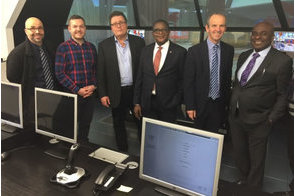Equipping Nigerian education system for innovation

Summary
The current generation of our public school students learn in dilapidated classrooms – some are even taught under trees. They study science without knowing what a beaker or test tube looks like.
The long-term effects of illiteracy and low literacy levels, especially in developing countries like Nigeria, are continuing concerns for international development partners. Poverty and insecurity are often consequences of a broken education system.
According to Benjamin Franklin, one of the Founding Fathers of the United States, “An investment in knowledge always pays the best interest.” This is true because education still remains the most powerful weapon that can be used to change the world. So, if education has such transformational impact, there is the need to provide fully functional educational training facilities that can truly deliver innovation to help a country like Nigeria to achieve its national aspirations.
The major obstacle to improving the standard of education in Nigeria is inadequate funding. There is an urgent need to close the funding gap in the sector so that students and pupils can stay in school in decent classrooms, study in well-equipped libraries and world-class laboratories. The current generation of our public school students learn in dilapidated classrooms – some are even taught under trees. They study science without knowing what a beaker or test tube looks like. This generation of ‘under-the-tree’ students can hardly be motivated or intellectually stimulated enough to change Nigeria for the better, much less the world.
Over the years, budgetary allocations to the education sector in Nigeria have consistently fallen short of the recommendation by United Nations Educational, Scientific and Cultural Organisation (UNESCO) of 26 percent of a country’s annual budget. The allocation to the education sector in the N6.8 trillion 2016 budget proposal presented to the National Assembly in December 2015 is lower than the allocations to the sector in the Appropriation Acts of the previous years. The federal government has budgeted N369.6 billion in 2016, while N483 billion, N495 billion and N427 billion were the budgetary allocations for the education sector in 2015, 2014 and 2013, respectively.
Nevertheless, of the non-debt recurrent expenditure to critical sectors in the proposed 2016 budget, the Ministry of Education has been given the highest allocation. The Ministry of Works, Power and Housing has been apportioned the highest allocation for capital expenditure in the critical sectors at N433.4 billion. But the good news for the education sector also has to do with the various programmes the government has enumerated. Through the Office of the Vice President, the government has planned a conditional cash-transfer programme, which includes a free education scheme for Science, Technology, Engineering and Maths (STEM), where tuition would be paid for about 100,000 STEM students in tertiary institutions in the country.
If successfully implemented, the scheme will encourage students to study science and technology courses, and in the long run boost our technological advancement as a nation. About N5 billion will be spent on this particular scheme.
The government also plans to recruit 500,000 unemployed graduates and National Certificate of Education holders as teachers and deploy them to primary schools to enhance the provision of basic education especially in rural areas.
The proposed budget figure is for federal institutions (which account for about a third of the total number of schools in Nigeria). The 36 states and the Federal Capital Territory will present their education budgets separately. The aggregate expenditure – especially as the federal government plans to implement its social investment plan in collaboration with states – would potentially have a positive impact on the education sector.
Part of the troubling deficit in our education system is lack of qualified teachers. Poor remuneration often drive the brain drain from our schools as NCE holders and graduates in education scamper to take up jobs in the private sector. Past governments have failed to address this situation that has degraded learning outcomes. The intervention of President Muhammadu Buhari’s administration is a step in the right direction. Addressing early education will prove to be crucial in building well-rounded members of our society who would help develop our nation.
A functional education system is the bedrock of any society. A mind expanded through education sees new horizons and proffers solutions to challenges we face as a people. Developed countries have recognized the role of functional education in their industrial and technological growth. This informs the high investment in their education sector.
The seed for Nigeria’s industrial renaissance must be planted today by building both the hard and soft infrastructure that will support the research and innovation that will catalyze our technological advancement. By adequately funding our education system, equipping our libraries and laboratories, and providing a conducive environment for our pupils and students to learn, we will retain the huge resources that affluent Nigerians spend on educating their children and wards in foreign institutions, including in smaller West African countries like Ghana and Benin.
Our researchers will also be encouraged to pursue research interests that serve the aspirations of our nation and help achieve our long-term development visions. Under the right environment, our educational institutions will be able to evolve the courses and learning system that are relevant to our development needs. Our education sector will also become a potential source of foreign exchange to our economy as foreigners come to learn in our institutions.
Henry Nwosu is Managing Director, FEH Projects Ltd, a Lagos-based procurement solution provider, working with global businesses to provide solutions in the Food, Education and Healthcare sectors.
Related
-
UN chief makes recommendations for reopening schools
António Guterres said the COVID-19 pandemic has created the largest disruption to education in history.
-
NDDC officials tour post-graduate training facilities at UK university
NDCC funds scholarships for post-graduate students at the Robert Gordon University.
-
UNESCO wants countries to invest far more in physical education
Two-thirds of pupils with disabilities are deprived of any physical education, the report also says.









